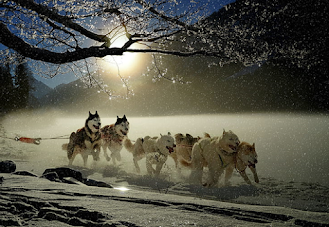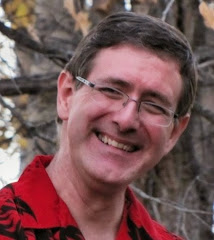I love watching movies!
But there was one movie that I hadn’t gotten around to watching even though the
dvd was sitting on my coffee table for months.
It was Call of the Wild, by Jack London and starring Harrison Ford.
I remember it being one
of the first grown up books I read as a kid.
Call of the Wild is not always pleasant.
But the struggle to get dogs to pull a sleigh together is a vivid image.
They go from a pack of snarling, growling individuals that snap and bite to a
team that pulls together and gets everything from mail to food delivered across
long stretches of cold northern territory.
The scriptures today
remind me of the courage and hard work that goes into forming a dogsled
team. Jesus knew where he wanted to go,
and nothing was going to steer him away from his purpose. People who tried to get him to change course
were left behind. His fellow travelers,
the team he had put together, were told in no uncertain terms that there was
only one destination, and if they didn’t want to go in that same direction,
they were not in the team. The priority
was on the destination, nothing else. The
destination was bigger than family connections, cultural traditions, or
expectations of rewards. The goal had to
be at the centre of every decision along the way. Even revenge on those who insulted him would
not get to his goal. “Shall we
rain down fire from heaven
and destroy them like the prophets of old did to their enemies?" Nope, Jesus had no patience for treating
people like that, no time for violence. He
wanted his disciples to love their enemies.
He wanted team players
who would pull their weight and let go of the need to be right, or the need for
power or control. To practice
forgiveness of the wrongs others did and keep focused on helping people hear
the good news of God’s redeeming love.
He wanted to pull
people from their individual agendas into a team that could smoothly go the
distance and be in it for the long haul.
Just like a dogsled team working together to travel the vast distances
in the north.
Paul was focused on
that too. In his letter to the
Galatians, he reminded them of the end goal they were working towards, and what
stood in the way of them reaching it. A
goal of love, where everyone would know true freedom to live without anxiety,
guilt, shame, resentment, depression, anger and fear. Paul’s phrase ‘Living by
the flesh’ is better translated as ‘living by impulsive selfishness”, and the
list of attitudes and behaviors that destroy teamwork as well as mental health
is long. Some seem odd to us today. I’m not sure the last time I was tempted to
indulge in some sorcery, for example, if I substitute superstition instead of
sorcery, it has more meaning for me. The
rest, hostility, arguments, jealousy and the like certainly do tear us into
pieces and keeps us all from moving forward.
Snapping at one another like dogs fighting over the lead spot in the dog
team means that we are at a standstill.
The sled won’t budge and we won’t get one inch closer to Jerusalem! But when we deal in healthy ways with
conflict or selfish agendas, and substitute love and gentleness and the other
fruit of the spirit, we can really get flying as a team.
How do we know we are
using healthy ways? When we have love,
joy, peace, patient endurance, kindness, generosity, faithfulness, gentleness
and self-control, the fruits of the spirit.
When we open ourselves to Christ’s vision, when we set our faces to
Jerusalem, when we remember why we do what we do, the fruit reminds us and
guides us to rise above our impulses, selfishness and self-destructive behaviors. The fruit helps us to work together as a team
and to stay focused on where we want to go.
Where are we
headed? On the road to freedom, and not
just freedom for you and me, but freedom for all. Can you imagine what it would be like to feel
even a little freer from all the stress and challenge of your life? 5% less anxious about money or 5% less
jealous of your partner’s friendships or coworker’s successes or neighbor’s car
or family member’s vacation home or friend’s travel plans? 5% calmer, 5% more comfortable with prayer,
5% more courageous in talking about your faith? 5% more understanding of what
triggers your emotions? Now some of you
who are new to our church might be thinking these are ridiculous claims, and
maybe some of you who have been coming for a long time might feel the
same. But I bet if you think back to
what brought you here, you might recognize a yearning to have that freedom. And for those of us who have been here a
while, if we look back to who we were a month ago, a year ago or even ten years
ago, we might just be able to see that yes, we are that 5% better than we
were. I know that this congregation has
helped me develop more resiliency when it came to dealing with all the
craziness that Covid put us through. I
am definitely more prayerful than I was, and more focused on making our
community a healthier place for all, a little closer to being the new Jerusalem
that Jesus, Paul, Luke, John and more worked together to build.
The Call of the Wild
was in the end a call to freedom. We
have a call to freedom too, just like Buck the sled dog. The United Church of Canada says that we are
called to be a bold, connected, evolving church of diverse, courageous, hope
filled communities, united in deep spirituality, inspiring worship and daring
justice. Here we say we are called to Worship, Inspire, Engage, and Empower.
Together, with the Spirit, let us work as a team to journey to new ways of
living with each other and the world in love and freedom.



